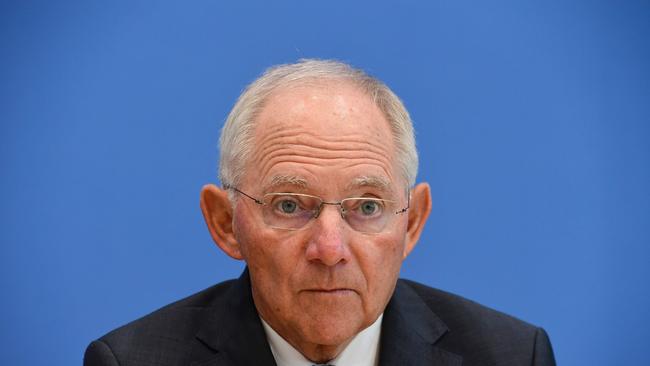Germany economy ‘favourable’ despite Brexit: Schaeuble
Germany’s finance minister said the country’s economy is sound due to strong domestic demand.

Germany’s economic fundamentals are sound because of strong domestic demand and despite possible negative consequences of the UK’s vote to leave the European Union, Finance Minister Wolfgang Schaeuble said Wednesday.
Meanwhile, German Chancellor Angela Merkel said the uncertainties are “limited” for the German economy due to Britain’s vote, and the remaining 27 member states of the EU must now focus their attention on improving their competitiveness.
“Germany’s economic conditions remain favourable. The British referendum hasn’t changed this in any noticeable way. This is also the assessment of Germany’s Deutsche Bundesbank,” Mr Schaeuble said during a briefing on the government’s 2017 budget plans.
“The main driving force of Germany’s growth is domestic demand, particularly private consumption, which is the best proof that regaining trust in the sustainability of public finances is stimulating growth more than what’s been said in interviews or some declarations,” he said.
Mr Schaeuble has repeatedly rejected calls for an economic stimulus program at home to help boost demand for goods from economically struggling eurozone countries.
He also said the UK cutting its corporate tax rate wouldn’t have a big impact on Germany, nor would it lead to a downward spiral of taxes in Europe.
“We don’t have any intention in Europe to begin a race to the bottom. This doesn’t make any sense,” he said. “Our efforts in Europe are to harmonise the bases for corporate taxation to some degree.”
UK Chancellor of the Exchequer George Osborne said earlier this month he planned to cut the corporation tax in the UK to 15 per cent or less in an effort to lure business investment as the economy reels from the Brexit vote.
The current rate is 20 per cent, and Mr Osborne had already planned to lower it to 17 per cent by 2020, which would make Britain’s corporate tax rate the lowest in the Group of 20 industrialised and developing economies, or G20.
Mr Schaeuble also said that Brexit would be an issue at the meeting of finance ministers and central bank governors from the G20 in China later this month.
On the agenda would be less the historic weakness of the British pound but rather geopolitical risks stemming from the Brexit.
“The risks for the economy ... are not negligible,” he said.
Earlier Wednesday, Germany’s cabinet approved the government’s 2017 spending and medium-term goals for the next four years, with a pledge to keep a balanced budget despite soaring costs linked to migration.
The budget plans are based on assumptions that the domestic economy will grow by 1.5 per cent next year, with this year’s figure forecast at 1.7 per cent.
He also weighed in on Italy’s banking woes, saying the country is not looking for exemptions in talks with the European Commission over helping its struggling banking sector.
Mr Schaeuble said he had spoken with Italian counterpart Pier Carlo Padoan:
“I have heard from him, and I have read this from Prime Minister [Matteo] Renzi, that Italy doesn’t wish for exemptions from existing rules, or any diversion, but it rather wants to stick to exiting rules.
“This is something that will be clarified between the Italian government and the European Commission ... and not from a third party, or a third country. One loves to blame Germans and the German finance minister for everything, but that’s not the case. The Commission is responsible for it.”
The comments come as Italy is considering how to help individual banks or the entire Italian banking system, which is suffering from a mix of giant holdings of bad loans, ultralow and negative interest rates, low profitability and high costs.
People familiar with the matter said the Italian government is assessing various options for a public intervention to shore up its banking system in the wake of the large drops in share prices suffered by the country’s banks after the UK’s decision to leave the European Union.
They said the government hasn’t decided whether the focus of any injection of public money would be troubled lender Banca Monte dei Paschi di Siena SpA or whether it would opt for a more systemic solution that could support the whole system.
Investors have been dumping Italian banking shares since the beginning of the year amid concerns over their financial health, in particular about their massive holdings of soured loans.
With Stefan Lange
Dow Jones Newswires





